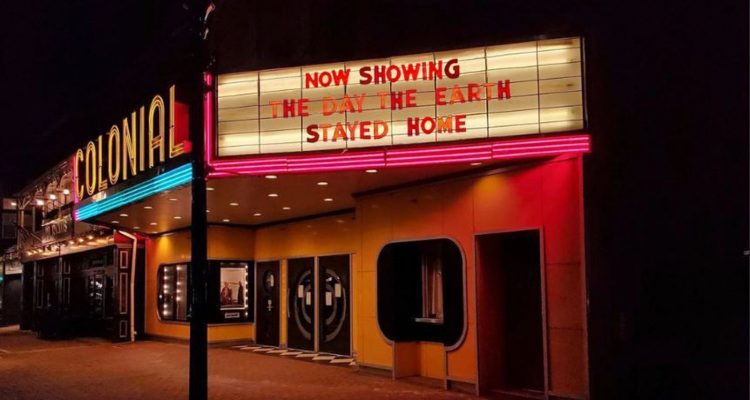With the COVID-19 pandemic on the way to completing its first year, things are starting to look a bit more hopeful on the entertainment side of things. Fans have begun to return to sporting events, bars and restaurants are welcoming patrons, and little by little, the feeling of communal joy is making its way back into people’s lives.
And yet something feels missing. As more and more numbers are being allowed into these venues, movie theatres across the country remain shockingly empty. Why such a disparity? Many places have come up with new, innovative ways to operate during the pandemic, and all the while theatres have been crushed by regulations. After a year-long hiatus for the movie-going experience, the movies are deserving of a true push to bring back normalcy.
From the very beginning of the pandemic, everyone from casual fans to market economists saw trouble ahead for those on the side of the movie industry. The moment the pandemic began to ramp up throughout the states, it was practically a foregone conclusion that the coronavirus would mark the end for not just 2020’s movie slate, but perhaps the theatre industry at large. Whether it be smaller hometown theatres or the massive conglomerate AMC theatres, movie theatres across the world have been left to sink or swim with seemingly little to no assistance by state and local governments. Stocks plummeted, theatres closed and for many, seats remain empty.
Coming off of the record-setting year that was 2019, which was packed with blockbusters like “Avengers: Endgame,” “The Lion King,” “Frozen II,” “Star Wars,” “Joker” and “Spider-Man,” it is striking to realize just how much movie fans have missed in the last year. For many, the movies had been a traditional hallmark of week-to-week entertainment. Like with most forms of art, theatres were a perfect common place for friends, families and strangers alike to gather and socialize with every new major release. Without theatres to go to, many people have had to resort to heavy droughts in any form of fresh entertainment content.
And the fans and theatres are not the only ones who have suffered. Movies like “Black Widow,” “Fast and Furious 9” and “A Quiet Place II” have all been battered around from release date to release date, causing upwards of hundreds of millions of dollars in lost revenue for movie studios. In one COVID-19 related debacle, the studio behind the upcoming James Bond film “No Time To Die” was forced to consider undergoing extensive reshoots just to update the product placement found within the film (specifically certain alcoholic beverages, car models and smartphone models).
But despite these studio’s woes, everything is not all bad from the business perspective. With Netflix’s growing dominance left unhindered by the virus, 2020’s lack of movie theatres provided a massive paradigm shift towards the new wave — the streaming market. From the older tentpoles like Netflix, Hulu and Amazon Prime Video, to new heavy hitters like Disney+, HBOMax and Peacock, many movie studios have turned to the streaming industry as their saving grace moving forward.
While in the short term this creates a much-needed boost in entertainment for casual consumers who have been waiting for new content to release, the growing shift towards the streaming market does present an interesting question for movie theatres going forward: is streaming meant to coexist with theatres, or “kill off” the movie-going experience?
This struggle is only growing with time. The most prominent example that has arisen is the fight with streaming service HBOMax’s new “Same Day Premieres” — a new deal that makes it so every single upcoming Warner Bros. movie releases both in theatres as well as on the service on the same exact day. This includes everything from invigorating dramas like the recently released “The Little Things” starring Denzel Washington, to family flicks like “Tom & Jerry,” to massive blockbusters like “Godzilla vs. Kong,” “The Suicide Squad” and the upcoming sequel in the Matrix franchise.
While the decision to go through with this came as a surprise to movie fans, it also came as a surprise to the directors and producers behind said movies. Many who had worked on these films presuming that they would be released in theatres were completely blindsided by WarnerMedia’s decision to release their film to streaming. One person who took harshly to this move was iconic director Christopher Nolan of “The Dark Knight” trilogy, as well as fan favorites like “Inception,” “Interstellar” and “The Prestige.” In a scathing statement to The Hollywood Reporter, Nolan remarked “Some of our industry’s biggest filmmakers and most important movie stars went to bed the night before thinking they were working for the greatest movie studio and woke up to find out they were working for the worst streaming service”.
While some may view Nolan’s words as being overly critical of the user-friendly decision, his statement is not without merit. For the many people who care deeply about the movie theatre industry and wish for things to go back to normal, the move towards streaming services acts as a direct diminution of any progress being attempted on behalf of the theatre industry. With nationwide COVID rates slowly but surely progressing towards a manageable number, coupled with the increased mobilization and application of vaccines, it is not too far-fetched to see a world where movie theatres are at least an option.
Like with most pandemic-related issues, there is definitely a tightrope walked when it comes to bringing theatres back to their old glory. But with bowling alleys, shopping malls and other recreational facilities available, it is safe to say that movie theatres deserve a chance to bounce back. In the coming months, hopefully theatres can receive the resources and regulations needed to reopen in a way that is safe and acceptable.


Leave a Reply